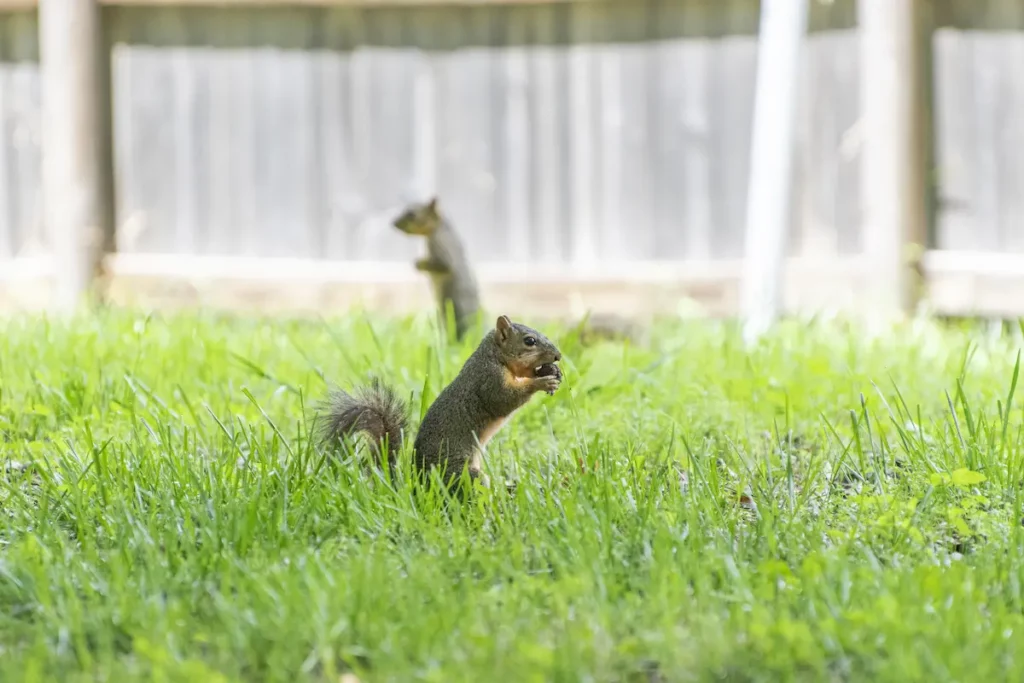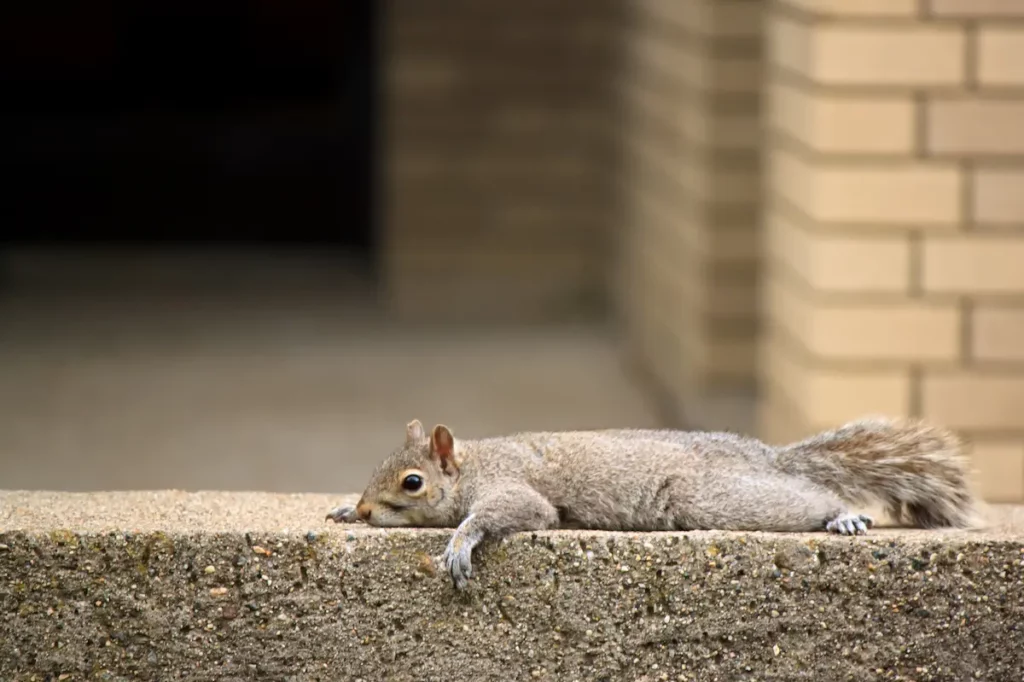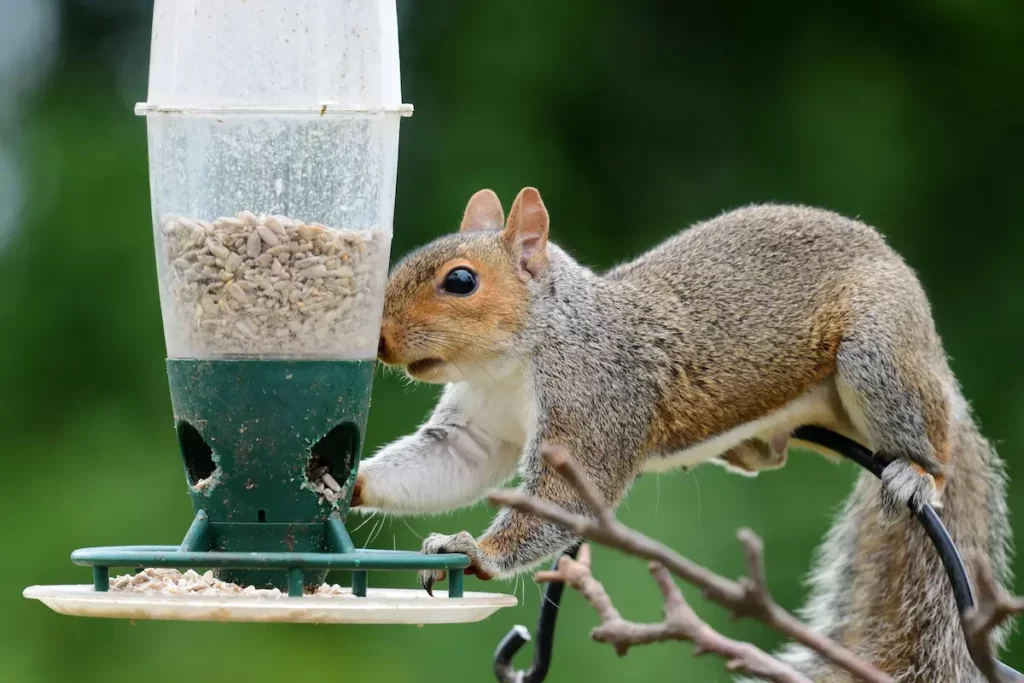When searching for the most effective squirrel repellent, several options are available.
Using plant or urine-based solutions or mechanical trapping devices, one can create a physical barrier.
There are four main types of squirrel repellents, but not all are effective.
The first defense is creating a physical barrier between squirrels and their intended food, such as netting, chicken wire, or tree collars.
The next types are plant-based or predator urine-based repellents.
The last type includes mechanical devices, like trapping, and newer technology, such as electronic devices that generate loud noises, ultrasound, flashes of light, or sudden jets of water.
However, the effectiveness of these devices varies.
Many homeowners find squirrels to be adorable little creatures and enjoy having some form of wildlife in their yards.
However, it’s important to remember that squirrels are rodents with front incisors that continue to grow nonstop.
This means they must constantly chew on things to keep their teeth from growing too long.
Unfortunately, this can damage plants, crops, wood, electrical wiring, and other items as they search for food, build their nests, or care for their young.
When squirrels invade your attic or create electrical hazards, you must act before it worsens.
Luckily, many humane methods can help stop or limit the damage from squirrel infestations.
If you’re looking for effective and humane methods to keep squirrels away without harming or using harmful substances, then you’re in the right place.
In this article, we will provide you with proven squirrel-repellent solutions that work and essential information that will help you holistically deal with squirrels in the long run.

Table of Contents
Related Reading: When Do Squirrels Have Babies? [INTERESTING FACTS]
Best Squirrel Repellent Options
Squirrels tend to cause damage to outdoor furniture, yards, and home structures.
Their constantly growing front teeth necessitate regular chewing.
This chewing can cause significant damage to wooden furniture, decking, and garden fencing.
Implementing a squirrel repellant strategy can greatly reduce potential damage caused by these animals.
Many options are humane and do not physically threaten squirrels or family pets.
Be sure to apply repellent frequently. Squirrels will avoid areas where they don’t find food.
I Must Garden Squirrel Repellent
This granular repellent is activated when the critters try to dig up bulbs and vegetables, and it releases a high dose of irritating botanical oils
- Stops digging in gardens and flower beds
- 2lb and new 3lb Granular Easy Shaker Jar
- No chemicals, poisons, or foul odors.
- It is birdlife-friendly but not intended for use directly in bird feeders.
- Long-lasting and safe around vegetables and seedlings
Messina Wildlife Squirrel Stopper
Specifically aimed at preventing squirrels and chipmunks from foraging and nesting in the garden and buildings.
- 32-ounce Trigger Bottle,
- Organic and safe for use around fruits and vegetables
- Ready-to-use indoor, outdoor, and in vehicles.
- Pleasant-smelling, easy-to-use formula
- Great for birdfeeders
The Exterminator’s Choice All-Natural Rodent Defense Spray
You can use this popular indoor and outdoor spray, including directly on bird feeders, as it does not deter or harm birds.
- 2 ounces and 1-gallon size
- An almost pleasant-smelling blend of peppermint and rosemary oil, with added garlic and white pepper
- The spray covers up to 750 sq. feet.
- Non-toxic and all-natural spray repellent
- It is not recommended for direct use on edible plants, but it should rather be used on barriers surrounding the base of the plants.
Achla Designs Squirrel Deflector
Bird feeders are vulnerable to squirrels, especially in winter.
One solution is to use deflective cuffs, which are easy to install, require no maintenance, and are highly effective.
Alternatively, you can spray the area with pepper spray, but it might not be as effective.
- A plastic cuff is to be installed around the base of the bird feeder
- 18 inches in diameter and fits a standard 4×4 post (post included).
- Sturdy materials to withstand harsh weather conditions and temperatures.
- Open up, snap in place, and secure with the clamp
- Fully adjustable baffle
- It can be mounted on PVC pipes or almost any other type of pole if used with an appropriate clamp.
Shake Away Fox Urine Granules
Fox urine granules remind upstart urban squirrels of the call of the wild! Squirrels have an instinctive fear of predators.
- Apply granules at the base of plants
- Scatter around areas in the yard you wish to protect from squirrels.
- Suitable for all seasons
- Long-lasting, although not quite impervious to rain
- No chemicals or pesticides.

Understanding Squirrel Behavior
Squirrels are synanthropic, like urban doves.
Due to their long association with human environments, they have lost their fear of humans and become fully integrated into the modern urban habitat.
When humans stop leaving out easily accessible food sources such as trash and crops, squirrels may become hungry and resort to aggressive and opportunistic feeding habits.
These hungry squirrels will eat anything they can find, beginning with their traditional diet of nuts and seeds, shrubs, and flowers and then expanding to include insects, slugs, spiders, lizards, and even bird eggs.
The lifespan of a squirrel in the wild typically ranges from six to 10 years, but they can live up to twice as long in captivity.
Therefore, it’s advisable to take action sooner rather than later, rather than waiting for a large squirrel population to become a problem.
Intelligent creatures can quickly learn to avoid traps and eat food from areas with repellents if hungry.
Using a combination of methods is the most effective way to eliminate a squirrel problem.
Reduce Food in Your Yard
Reducing feed availability in your yard will make squirrels automatically go to other yards.
To prevent squirrels from getting into your trash cans, make sure to properly seal them and dispose of any garbage or other potential food sources.
If you have nut or fruit trees in your yard, it’s important to keep the ground beneath them clear and consider installing protective tree guards.
These guards can make it more difficult for squirrels to climb up and access the food, keeping your trees and their fruit safe.
You can find these guards at your local hardware or garden center.
Trapping Mechanisms
While trapping can decrease squirrel populations, certain species require permits, and relocation may be restricted.
It is important to note that there are different types of live traps, such as glue, cage, or box traps, which can be either lethal or non-lethal.
These traps can be purchased at garden centers or local hardware stores.
However, it is important to keep in mind that there are also lethal traps, such as body-gripping, scissors, and harpoon traps, which should only be used by professionals in cases of severe infestations.
Natural Predators
The mortality rate of baby squirrels in the wild is significantly high because they share their habitat with predators such as snakes, owls, raccoons, coyotes, bobcats, and even feral cats.
In some cases, household pets such as cats and certain dog breeds have a natural hunting instinct that may help maintain the ecological balance during occasional hunting expeditions.
Physical Prevention
You can create a barrier using physical deterrents such as netting or fencing to keep squirrels away from your vegetable or raised bed gardens.
This can be a very effective squirrel repellent.
Additionally, placing a metal or plastic collar around fruit trees that are about 2 feet wide can discourage squirrels from climbing.
To prevent squirrels from getting to bird feeders, try using squirrel-resistant feeders with a rotating design that moves when the squirrel climbs on it.
Another option is to use a plastic collar underneath the seed platter, which makes it difficult for squirrels to grip.
You can also use pepper spray on and around trees and bird feeders as birds are not affected by it, but squirrels are.
Noise or Motion Devices
Sonic devices emit high-pitched tones that are inaudible to humans but supposedly intolerable for squirrels.
However, despite the prolific marketing campaigns and an explosion of sonic devices, scientific peer-reviewed publications have consistently shown that ultrasonic devices do not affect squirrels as a repellent.
Consequently, we have avoided recommending these devices as an effective squirrel repellent.
However, they might work for you, so don’t hesitate to add them to your shopping list!
Motion sensor technology has become very affordable, and it can easily be integrated into various devices to detect sudden movements, unexpected sounds, or trigger a burst of water.
These devices are particularly effective when used in vegetable gardens, especially when combined with other repellents and if you move them around frequently.
Motion-activated sprinklers are a great example of such devices.
Solar-powered bird deterrents like owl or eagle-shaped devices may be effective if moved regularly and placed away from bird feeders.

Plant-Based Repellents
Plant-based pellets function by emitting an unpleasant scent or taste, serving as a squirrel repellent.
They are generally made of organic and non-toxic ingredients and often contain high concentrations of essential oils such as peppermint, garlic, and pepper.
Certain sprays can be used on plants, flowers, and food crops, but it’s important to be mindful of any allergies you may have to the active ingredients.
Instead of directly spraying the plants, a more effective method would be to soak some rags with the repellent and wrap them around the plant or place soaked rags inside a zip-lock bag after making a few punctures in the plastic.
This method not only makes the product more potent but also weatherproofs it.
It’s important to apply repellents generously and frequently, as even very hungry squirrels may ignore the unpleasant odor and consume it anyway if they have no other options.
If you enjoy gardening, and the climate is suitable, you may try planting a type of lily known as Kaiser’s crown (Fritillaria imperialis), which reportedly repels rodents.
Predator Urine Repellent
Concentrated pellets of predator urine, such as fox, coyote, raccoon, and wolf, can repel squirrels because they have an instinctive fear of these animals.
Additionally, squirrels are averse to the scent of mothballs and putrescent eggs.
Granules or grains made from these substances are more long-lasting than natural irritant sprays and require reapplication only every 30 days or after heavy rain, making them a natural way of repelling squirrels.
When your dog or cat goes outside, they leave their scent in the garden, which keeps the squirrel population in check.
Continue Reading: Best Mandarin Bird Feeder That Keep The Squirrels Out
Final Thoughts
Squirrels are highly active and energetic creatures, which means that they might require more than one solution to deter them and maintain the desired balance.
They tend to adapt to or discover ways around most of the commercial repellents you purchase, so it’s essential to mix and match repellents frequently.
Low- or no-maintenance physical barriers are a humane and sustainable solution for growing fruits and vegetables.
With a little strategic planning and finding the right product, you will soon find peace with your squirrel repellent solution.
Enjoy living the outdoor life!!!
